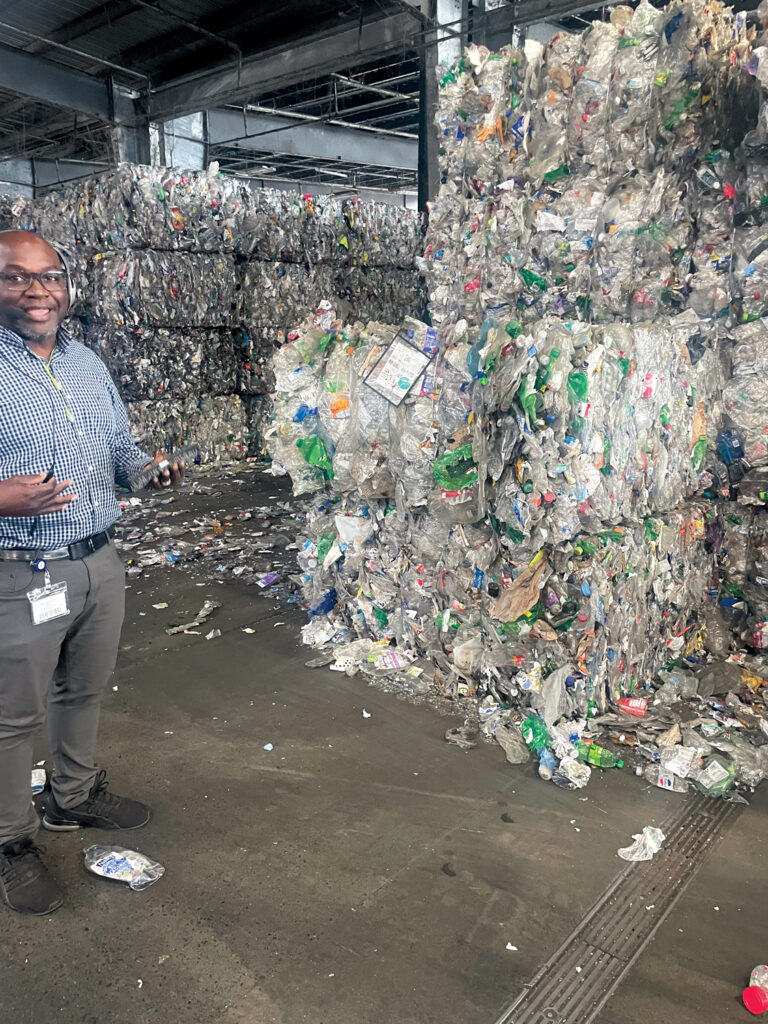UNIFI gives sustainability awards and REPREVE facility tours
July 1st, 2025
UNIFI® Inc. expanded its eighth sustainability awards this year to include speakers and tours of its facilities that create REPREVE®, including the intake of bales of bottles and textiles, the creation and cleaning of bottle flakes, and yarn production and dyeing. Plant manager Kerby Stone explained the recycling process during the tour of the Reidsville, […]
Quantum physics inspires interactive fabric art
July 1st, 2025
Images: Transformit A 2023 interactive art project involving two Maine artists, Cynthia Thompson, owner of Transformit in Gorham, and James LaPlante, Sputnik Animation, South Portland, led to another. The 2024 installation was inspired by quantum physics concepts and explored through giant lotus flowers. “I realized that we could deconstruct several of our [Dazzle] rental flowers,” explains […]
Consortia pursue solutions to textile recycling’s challenges
July 1st, 2025
North Carolina State University Wilson College of Textiles fiber researchers Erika Ford, Ph.D., and Hajara Babayo. Image: The Textile Engine /Franzi Charen Imagine a future when all textiles are recycled, when trucks no longer haul millions of tons of them to landfills and incinerators and it’s easy to put them into a smooth, efficient waste […]
California’s Responsible Textile Recovery Act
July 1st, 2025
Signed into law by California Gov. Gavin Newsom in September 2024, the Responsible Textile Recovery Act (RTRA) intends to drastically change the life cycles of apparel and textiles in California. The law does not impact just California-based businesses; it imposes obligations on anyone who sells, offers for sale or distributes certain products in California, regardless […]
Making wearable technology work
July 1st, 2025
This image demonstrates capacitive touch using conductive yarns that are knitted into the garment. This example highlights a potential integration of hard goods and electronics with soft goods and wearables. The prototype features a small circuit board attached to a section of knit fabric with conductive yarns. Image: Priority Designs We are in the middle […]
PFAS regulations offer challenges and opportunities
July 1st, 2025
Glen Raven’s Joseph Davis says the company’s transition to eliminate PFAS in manufacturing began nearly a decade ago and supports the company’s commitment to sustainability. Glen Raven has offered non-PFAS solutions for its Sunbrella® Contract fabrics since 2019, followed by a rolling transition across the entire Sunbrella fabric portfolio beginning in 2023. Image: Sunbrella Regulations […]
Navigating Canadian market challenges
July 1st, 2025
A hybrid frame tent from Fiesta Tents’ Legacy series that was built on a floating dock for a wedding (right) and a clearspan reception tent from its Solar System line. Image: Fiesta Tents As of this writing, most Canadian textile manufacturers whose goods are included in the Canada-United States-Mexico Agreement (CUSMA) haven’t been directly affected […]
Boatman Marine Canvas values learning and planning
July 1st, 2025
Photography of Mike Boatman, Boatman's Marine Canvas, by Charlie Neuenschwander If Mike Boatman were to write a book on what he’s learned from 30-plus years in the marine fabrication industry, it would be one page with a single line: “Don’t be a jerk.” This short and simple philosophy has grounded him through the ins and […]
Low-temperature process for difficult-to-recycle plastics, including PVC
July 1st, 2025
Oils derived from recycled plastics can be turned into new products. Image: Hebrew University of Jerusalem/Hadar Dolan A low-temperature chemical recycling process has the potential to return difficult-to-treat plastics such as LDPE, HDPE and PVC back into oils to be remade into plastics or other products. Developed at the Hebrew University of Jerusalem in Israel, the […]
Avantium demonstrates scalability of chemical recycling
July 1st, 2025
Polyester residue from cotton textiles after recycling. Image: Avantium Renewable polymers company Avantium of Amsterdam, Netherlands, conducted research and an economic study on poly-cotton chemical hydrolysis recycling, finding a case for textile waste feedstock to create input for its operations compared to fructose or hardwood. Its method involved superconcentrated hydrochloric acid to produce a glucose […]
 TEXTILES.ORG
TEXTILES.ORG












